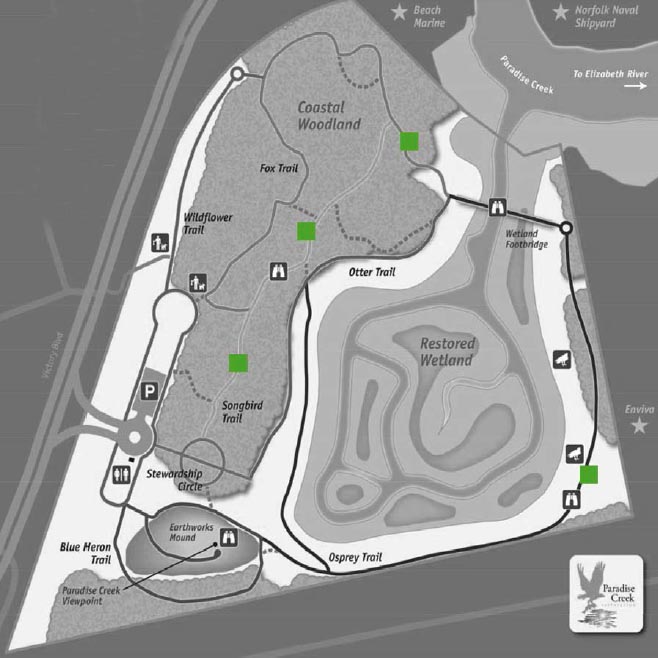Obstacles in Paradise
Family Activities_Greenberg Olsen Hardy Leas Hinch(click PDF)
Spring 2013
Team members: Jordana Greenberg, Sarah Olsen, William Hardy, Christina Leas, Rebecca Hinch
Family Activities for Paradise Creek Nature Park
Our team was assigned the task of designing a program for families visiting the newly opened Paradise Creek Nature Park in Portsmouth, Virginia. In correspondence with the Elizabeth River Project (ERP), our main objective was to design activities that facilitated a relationship between the community’s families and the natural environment, while also encouraging team-building skills and knowledge of the local ecology. Although there is an overwhelming amount of talk about sustainability very few people actually act on it, let alone truly understand what it entails. It is this lack of knowledge and lack of appreciation for nature that is preventing our world from progressing and promoting environmentally friendly lifestyles, and that is exactly what our project of the Paradise Creek Nature Park intends to address.
We designed an obstacle course comprised of ten structures that family members can go through together while at the park. The structures are educational, in that most are based around interactions between native plant and animal species, are eco-friendly, in that they’d be built almost exclusively from natural and recycled materials, and encourage cooperation and communication between park visitors. This report details the ideas, influential sources, educational benefits, estimated costs, necessary materials, and basic construction processes associated with each structure.
After many changes in our view of the scope of the project, modifications to our timeline, and research on similar projects, we have managed to develop a design that we call “Obstacles in Paradise.” We have provided ERP with ten structures that they may pick and choose from to add to their park. Our team reasoned that if ERP chose to adopt our project, they could begin by implementing the four best structures first and evaluate if those structures attracted more visitors and enhanced visitors’ park experience. Once this evaluation period had passed, ERP could continue to add structures or stop construction with the initial four. Of course, before any building of structures could begin, we would need to acquire safety approval from the local government, advertise the obstacle course, recruit volunteers to help with construction, attain the needed materials, and plan seasonal events to continue to attract visitors.
Although we extensively researched obstacle course structures and thoughtfully designed ten unique structures that met our project’s objectives, we could develop the project further. We currently lack knowledge of local building and safety regulations, and we have not seen the park aside from photographs, making visualizing a completed project difficult. With that said, our obstacle course provides ERP with a variety of ideas to consider for family visitor programming. Most importantly, we met our group’s objectives of educating visitors and facilitating cooperation among visitors, with the core goal of deepening the relationship between park visitors and the local ecology. If visitors have memorable experiences in Paradise Creek Nature Park, ideally they would feel more connected with the natural environment and thus be more inclined to conserve and restore it. Ultimately, we hope that “Obstacles in Paradise,” based on the ideas presented by Joshua Yates, will help to make “sustainability” less of a buzzword and more of a principle of our culture. After all, we live in a world in which, “…humans, as a species, are not just biological agents, but also geological agents,” meaning our behavior shapes our environment, and thus we have the responsibility to maintain that environment for not only ourselves, but also the entirety of world species.

